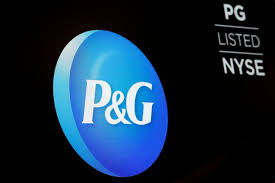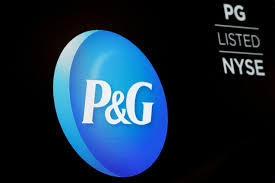
Procter & Gamble Co reported quarterly earnings that fell short of expectations and anticipated reduced sales growth, blaming rising transportation and commodity costs, consumer reductions, and retailer reluctance to raise pricing.
According to Refinitiv data, P&G shares plummeted as much as 6% in the morning after the business failed quarterly earnings projections for the first time in at least five years.
In a conference call with the media, P&G Chief Financial Officer Andre Schulten warned that the company is seeing "some revival" of shoppers choosing cheaper store brand items in several areas. In a conference call with analysts, he stated that private label brands in Europe are stronger.
Consumers are also buying less as a result of the company's price increases to cover costs and safeguard profit margins.
"You see consumers maybe scrimp for a period of time, use up inventory, and that's what we're seeing," Schulten said.
Schulten went on to say that retailers' reactions to price hikes announced in July were "as expected."
"Nobody is pleased about the continued inflationary trends that we're seeing," he said, adding that discussions remain "constructive."
Walmart is one of P&G's largest retail customers, accounting for almost 15% of its revenues last year. The firm has warned that it will make far less money this year than previously anticipated.
The pandemic's waves, blocked shipping ports, and the Russia-Ukraine war have jumbled global supply chains and resulted in price increases for commodities such as pulp, resin, and polypropylene, reducing consumer products manufacturers' earnings.
"As we look forward to fiscal 2023, we expect another year of significant headwinds," P&G Chief Executive Officer Jon Moeller said in a statement.
P&G, which manufactures a wide range of products such as Pampers diapers, Tide laundry detergent, Bounty paper towels, and Charmin toilet paper, forecasts average fiscal 2023 profits per share of $5.93, which is lower than analysts' projection of $6.02. It predicted a $3.3 billion damage from a stronger dollar as well as higher commodities and freight expenses.
A rising dollar often affects profitability for corporations with global operations and significant sales in foreign currencies, such as P&G.
According to IBES data from Refinitiv, the company earned $1.21 per share on an adjusted basis in the fourth quarter ended June 30, missing analysts' projections of $1.22 per share.
P&G's net sales increased 3% to $19.52 billion, exceeding analysts' expectations of $19.41 billion, as it benefited from higher commodity prices.
Prices across P&G's brands, from Crest to Old Spice, jumped by approximately 8 per cent on average in the fourth quarter, while sales volumes declined by roughly 1 per cent.
"One of the things that hurt them this quarter, is they didn’t want to or couldn’t push price as much," said Andrew Choi, a portfolio manager at P&G investor Parnassus Investments.
Alliance Bernstein analysts noted in a research note that store brand cleaning items and paper goods such as toilet paper are gaining traction, posing a challenge to P&G. According to the researchers, the corporation also lost market share in laundry goods.
The company forecasts organic sales growth of 3 per cent to 5 per cent in fiscal 2023, down from over 7 per cent% in fiscal 2022, indicating a decline in consumer demand.
(Source:www.flipboard.com)
According to Refinitiv data, P&G shares plummeted as much as 6% in the morning after the business failed quarterly earnings projections for the first time in at least five years.
In a conference call with the media, P&G Chief Financial Officer Andre Schulten warned that the company is seeing "some revival" of shoppers choosing cheaper store brand items in several areas. In a conference call with analysts, he stated that private label brands in Europe are stronger.
Consumers are also buying less as a result of the company's price increases to cover costs and safeguard profit margins.
"You see consumers maybe scrimp for a period of time, use up inventory, and that's what we're seeing," Schulten said.
Schulten went on to say that retailers' reactions to price hikes announced in July were "as expected."
"Nobody is pleased about the continued inflationary trends that we're seeing," he said, adding that discussions remain "constructive."
Walmart is one of P&G's largest retail customers, accounting for almost 15% of its revenues last year. The firm has warned that it will make far less money this year than previously anticipated.
The pandemic's waves, blocked shipping ports, and the Russia-Ukraine war have jumbled global supply chains and resulted in price increases for commodities such as pulp, resin, and polypropylene, reducing consumer products manufacturers' earnings.
"As we look forward to fiscal 2023, we expect another year of significant headwinds," P&G Chief Executive Officer Jon Moeller said in a statement.
P&G, which manufactures a wide range of products such as Pampers diapers, Tide laundry detergent, Bounty paper towels, and Charmin toilet paper, forecasts average fiscal 2023 profits per share of $5.93, which is lower than analysts' projection of $6.02. It predicted a $3.3 billion damage from a stronger dollar as well as higher commodities and freight expenses.
A rising dollar often affects profitability for corporations with global operations and significant sales in foreign currencies, such as P&G.
According to IBES data from Refinitiv, the company earned $1.21 per share on an adjusted basis in the fourth quarter ended June 30, missing analysts' projections of $1.22 per share.
P&G's net sales increased 3% to $19.52 billion, exceeding analysts' expectations of $19.41 billion, as it benefited from higher commodity prices.
Prices across P&G's brands, from Crest to Old Spice, jumped by approximately 8 per cent on average in the fourth quarter, while sales volumes declined by roughly 1 per cent.
"One of the things that hurt them this quarter, is they didn’t want to or couldn’t push price as much," said Andrew Choi, a portfolio manager at P&G investor Parnassus Investments.
Alliance Bernstein analysts noted in a research note that store brand cleaning items and paper goods such as toilet paper are gaining traction, posing a challenge to P&G. According to the researchers, the corporation also lost market share in laundry goods.
The company forecasts organic sales growth of 3 per cent to 5 per cent in fiscal 2023, down from over 7 per cent% in fiscal 2022, indicating a decline in consumer demand.
(Source:www.flipboard.com)





